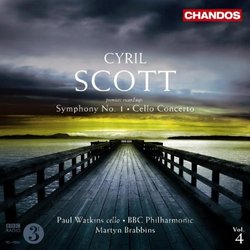| All Artists: Cyril Scott, Martyn Brabbins, BBC Philharmonic Orchestra Title: Cyril Scott: Symphony No. 1; Cello Concerto Members Wishing: 2 Total Copies: 0 Label: Chandos Original Release Date: 1/1/2008 Re-Release Date: 3/4/2008 Genres: Special Interest, Classical Styles: Forms & Genres, Concertos, Symphonies Number of Discs: 1 SwapaCD Credits: 1 UPC: 095115145227 |
Search - Cyril Scott, Martyn Brabbins, BBC Philharmonic Orchestra :: Cyril Scott: Symphony No. 1; Cello Concerto
 | Cyril Scott, Martyn Brabbins, BBC Philharmonic Orchestra Cyril Scott: Symphony No. 1; Cello Concerto Genres: Special Interest, Classical |
Larger Image |
CD Details |
CD ReviewsA triumphant finish to the Chandos series Dr. Richard M. Price | London, UK | 03/04/2008 (4 out of 5 stars) "With this CD, the fourth of the series, Brabbins and the BBCPhil complete their survey of the orchestral music of Cyril Scott. The high quality of both performance and recording won the sympathy of the critics from the start, and reactions have been uniformly respectful and often enthusiastic. The contrast with the dismissal of Scott's music for decades previously could not be more marked; as recently as 1995 the Blackwell History of Music in Britain thought it adequate to cite Cecil Gray's denigration of Scott's music as secondhand Debussy - a charge made possible only by misunderstanding Debussy and not listening to Scott. What is immediately obvious is that Scott had extraordinary gifts as an inventor of novel orchestral sounds. This is well illustrated by the major work in this latest issue - the Cello Concerto of 1937, which is full of novel effects of orchestral colour and never sounds like anyone else. The same year saw the appearance of two other major works - the Symphony 'The Muses' and the Sonata Lirica for violin and piano (both of which have also been recorded recently). The symphony was published at the time but never performed; the other two works were not even known to exist till now, yet they show Scott at his best. Even in the best of Scott there are, admittedly, problematic features: his notion of musical development is too rhapsodic, and the musical interest tends to be at its most riveting in the long opening movements, with a certain slackening thereafter (though his middle movements are sometimes magical). His musical language remains, however, of exceptional interest, since he continued to develop throughout his life, in complete independence of the trends around him; the notion once prevalent that Scott developed a personal idiom and then became stuck in it arose from ignorance of his later works, and is a charge much more justly levied against several of his English contemporaries. And even if Scott's music is never 'profound' or intensely expressive, it has personality - that of an ever inquisitive intellect, balanced by an inner repose. The note of disquiet that sounds in much of his later music (the Cello Concerto is an example) is all the more arresting because it was, it appears, unconscious. Is there a danger that now that Chandos has completed its work Scott will slip back into obscurity? Is Scott to be one of those composers whom record companies discover but otherwise remain unplayed? It would be risky to put on one of his major works in the Royal Festival Hall, but good amateur orchestras would find the unique sound-world of his music hugely rewarding, and its performance less subject to invidious comparison than that of more familiar repertoire."
|
